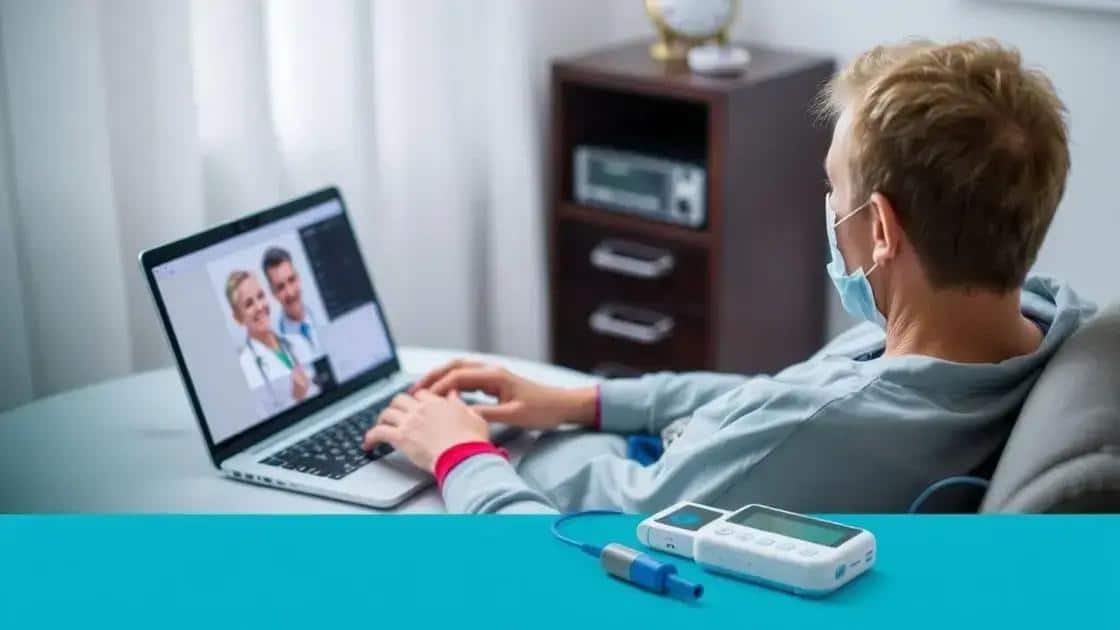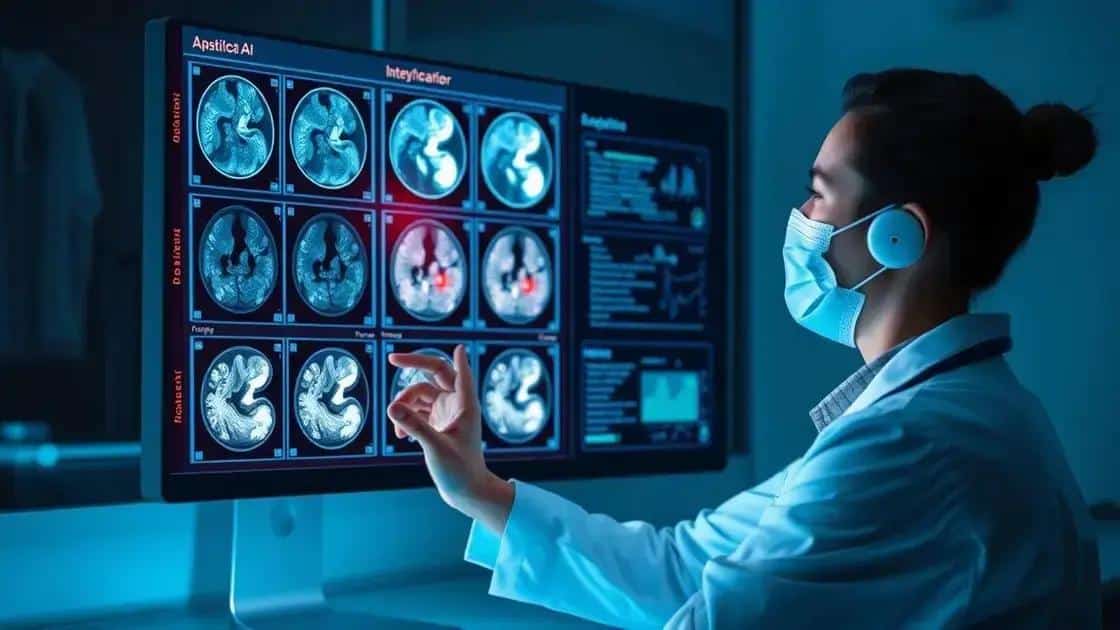Health tech advancements trends you need to know

Health tech advancements trends, such as AI in diagnostics and telemedicine, are enhancing patient care through increased accuracy, personalized treatments, and greater accessibility to healthcare services.
Health tech advancements trends are changing the way we experience healthcare. With technology evolving at lightning speed, you might be wondering how these changes can impact your health journey. Let’s dive into what’s trending and how it affects us.
Innovative technologies shaping health care
Innovative technologies are significantly reshaping healthcare, leading to better patient outcomes and improved efficiency. This landscape is changing rapidly as new solutions emerge, making healthcare more accessible and personalized.
Examples of Innovative Technologies
Some groundbreaking technologies are paving the way for advancements in healthcare. These advancements include:
- Telehealth: Remote consultations allow patients to connect with healthcare providers without traveling.
- Artificial intelligence: AI enhances diagnostics and personalizes treatment plans by analyzing health data.
- Wearable devices: These gadgets track vital signs and health metrics, empowering individuals to take charge of their health.
As we delve deeper into these innovations, it’s fascinating to see how they integrate into everyday healthcare practices. Telehealth, for instance, has become an essential service, especially during challenging times, providing immediate care from the comfort of one’s home.
The role of AI in healthcare cannot be overstated. By processing vast amounts of data quickly, AI assists doctors in diagnosing conditions earlier and with greater accuracy. This not only saves time but also provides a higher standard of care.
Moreover, wearable devices are revolutionizing the way we monitor our health. People can now keep an eye on their heart rate, activity levels, and other critical metrics, all from their wrist. This democratization of health monitoring allows individuals to make informed decisions about their well-being.
Incorporating these innovative technologies into daily healthcare practices is pushing the boundaries of what’s possible. As we continue advancing, the future of healthcare appears brighter and more promising than ever.
Trends in telemedicine and remote monitoring

Trends in telemedicine and remote monitoring are reshaping how healthcare is delivered. These advancements are making it easier for patients to receive care from the comfort of their homes.
The Rise of Telemedicine
Telemedicine has gained popularity, especially during the pandemic. It allows patients to consult with healthcare providers via video calls or phone. This method reduces the need for in-person visits, saving time for both patients and providers.
Many people appreciate the convenience it offers. They can access specialists who may not be available locally, leading to better health outcomes. With just a few clicks, patients can receive medical advice without the hassle of travel or long waiting times.
Remote Monitoring Technologies
Alongside telemedicine, remote monitoring technologies are emerging as key players in healthcare. These tools let healthcare providers track patients’ vital signs and health conditions from a distance. Some popular tools include:
- Smart blood pressure monitors: Allow patients to send readings to their doctors automatically.
- Wireless heart rate monitors: Help detect irregular heartbeats and other conditions in real-time.
- Wearable fitness trackers: Encourage daily activity and monitor health metrics.
Remote monitoring protects patients from unnecessary hospital visits. It also enables healthcare providers to respond quickly to changes in a patient’s condition. By continuously tracking health metrics, providers can adjust treatments and prevent complications.
As we look at the future, it is clear that telemedicine and remote monitoring will continue to advance. Integration with wearable technologies will open up even more opportunities for proactive health management.
The rise of wearable health devices
The rise of wearable health devices is transforming personal healthcare. These devices offer users real-time data about their health, empowering them to make informed decisions.
What Are Wearable Health Devices?
Wearable health devices are gadgets designed to be worn on the body. They track various metrics, including heart rate, activity levels, and sleep patterns. By providing continuous monitoring, these devices help users stay aware of their health status.
Common examples include smartwatches and fitness trackers. These products not only help users track their workouts but also monitor health conditions. Most importantly, they make health tracking more engaging and accessible.
Benefits of Wearable Devices
The benefits of these devices are significant, impacting both physical health and wellness. Users of wearable health devices often report:
- Better health awareness: Continuous monitoring encourages individuals to take notice of their daily habits.
- Increased motivation: Seeing real-time data on performance can motivate users to stick to their fitness goals.
- Early detection: Some devices can alert users to unusual health patterns, potentially catching issues before they become serious.
As the technology behind wearables evolves, we can expect even more features tailored to individual health needs. New developments might include enhanced sensors, better battery life, and more accurate readings.
The popularity of wearable health devices shows no signs of slowing down. With more people focusing on personal wellness, integrating these tools into daily life enhances the journey toward better health.
Artificial intelligence in diagnostics and treatment

Artificial intelligence in diagnostics and treatment is revolutionizing healthcare. By using advanced algorithms, AI helps doctors diagnose conditions with greater accuracy and efficiency.
How AI Enhances Diagnostics
AI systems analyze vast amounts of data from medical images, lab results, and patient histories. This analysis can identify patterns that human eyes might miss. For example, AI can recognize anomalies in X-rays or MRI scans, assisting radiologists in making faster, more accurate diagnoses.
Some AI tools also predict potential health issues based on a patient’s medical history. These predictions allow healthcare providers to intervene earlier, improving patient outcomes.
AI in Treatment Plans
In addition to diagnostics, AI plays a crucial role in creating personalized treatment plans. By considering a patient’s unique genetic makeup and health history, AI helps tailor interventions that are more likely to succeed.
- Precision medicine: Treatments can be designed specifically for individuals based on their genetic information.
- Optimizing medication: AI can analyze how patients respond to various medications, ensuring the best choices.
- Monitoring during treatment: AI systems track patient responses in real time, allowing adjustments as necessary.
The combination of AI and healthcare is also making treatments more accessible. Telemedicine platforms incorporate AI to provide quick assessments and streamline patient-provider communication.
As technology advances, the impact of artificial intelligence in diagnostics and treatment will continue to grow. This integration enhances the quality of care and opens doors for innovation in how healthcare is delivered.
artificial intelligence in healthcare is paving the way for enhanced diagnostics and more personalized treatment options. As telemedicine and wearable devices advance, patients have greater access to their health data than ever before. This not only leads to better health outcomes but also fosters a proactive approach to healthcare. With ongoing innovations, the future of health technology looks bright, making healthcare more efficient and accessible for everyone.
FAQ – Frequently Asked Questions about Artificial Intelligence in Healthcare
How does AI improve diagnosis accuracy?
AI analyzes vast amounts of medical data, helping detect patterns and anomalies that may be missed by human eyes, leading to more accurate diagnoses.
What are the benefits of personalized treatment plans using AI?
AI tailors treatment options based on individual patient data, which can lead to more effective interventions and better health outcomes.
How do wearable devices support health monitoring?
Wearable devices track vital signs and activity levels in real-time, enabling proactive health management and encouraging users to maintain healthy habits.
Can telemedicine platforms use AI for better patient care?
Yes, telemedicine platforms can integrate AI to enhance patient assessments, improve communication with healthcare providers, and streamline care delivery.





